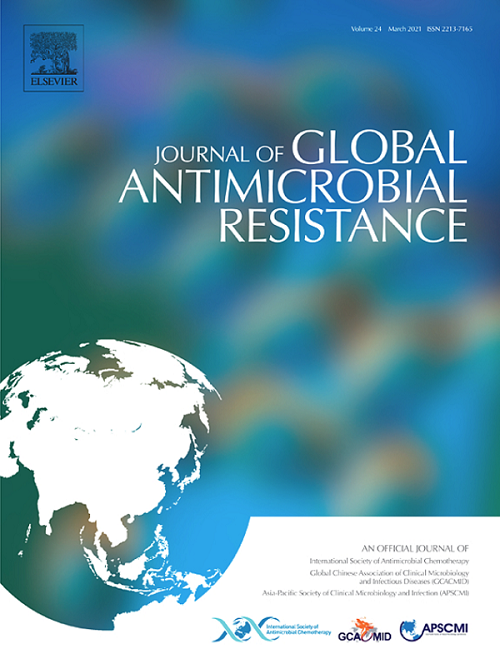Antimicrobial susceptibility and genetic diversity of staphylococcus pseudintermedius isolated from companion animals and human clinical patients in Japan: Potential zoonotic implications
IF 3.7
3区 医学
Q2 INFECTIOUS DISEASES
引用次数: 0
Abstract
Objectives
Staphylococcus pseudintermedius is the primary pathogen that causes pyoderma in companion animals. The increasing number of multidrug-resistant strains, including methicillin-resistant S. pseudintermedius (MRSP), has become a major concern, highlighting the need for comprehensive data on antimicrobial susceptibility. Furthermore, with advancements in the accurate identification of S. pseudintermedius in human clinical patients, it is imperative to elucidate its definitive zoonotic potential.
Methods
We analyzed 111 strains of S. pseudintermedius derived from companion animals and 21 strains of S. pseudintermedius from human clinical patients to clarify antimicrobial susceptibility and correlation between strains derived from companion animals and humans.
Results
Approximately half of the animal-derived S. pseudintermedius isolates were MRSP. The isolates, particularly MRSP, exhibited high resistance to multiple antimicrobials used to treat pyoderma. Although florfenicol and fusidic acid are not approved for the treatment of pyoderma in companion animals in Japan, their efficacy has been demonstrated. Genetic analysis revealed that ST121, ST45, and ST71 were the most common ST types in animals. Additionally, ten novel STs were identified. ST45 and ST71 have frequently been identified in companion animals abroad, suggesting potential international transmission. However, ST121 has rarely been reported outside Japan, indicating its unique evolutionary trajectory within the country. Furthermore, these sequence types were identified in strains isolated from humans. Core genome analysis revealed nearly identical genotypes, suggesting transmission from companion animals to humans.
Conclusion
A limited number of approved antimicrobials are effective against S. pseudintermedius (particularly MRSP), which is being transmitted as a zoonotic infection from companion animals to humans.
从日本伴侣动物和人类临床患者中分离的假中间葡萄球菌的抗微生物敏感性和遗传多样性:潜在的人畜共患意义
目的:假中间葡萄球菌是引起伴侣动物脓皮病的主要病原体。包括耐甲氧西林假中间球菌(MRSP)在内的耐多药菌株数量的增加已成为一个主要问题,这突出了对抗菌药物敏感性综合数据的需求。此外,随着在人类临床患者中准确鉴定假中间球菌的进展,阐明其最终的人畜共患潜力是必要的。方法:对111株伴侣动物源性假中芽孢杆菌和21株人类临床患者源性假中芽孢杆菌进行分析,明确伴侣动物源性假中芽孢杆菌与人类源性假中芽孢杆菌的药敏及相关性。结果:大约一半的动物源性假中间球菌分离株为MRSP。分离株,特别是MRSP,对用于治疗脓皮病的多种抗菌剂表现出高耐药性。虽然氟苯尼考和夫西地酸在日本尚未被批准用于治疗伴侣动物的脓皮病,但它们的功效已得到证实。遗传分析表明,ST121、ST45和ST71是动物中最常见的ST型。此外,还发现了10个新的STs。在国外的伴侣动物中经常发现ST45和ST71,表明可能存在国际传播。然而,ST121很少在日本以外的地方报道,这表明它在国内的独特进化轨迹。此外,这些序列类型在从人类分离的菌株中被鉴定出来。核心基因组分析显示几乎相同的基因型,表明从伴侣动物传播给人类。结论:有限数量的已批准抗菌剂对假中间葡萄球菌(特别是MRSP)有效,该细菌作为人畜共患感染从伴侣动物传播给人类。
本文章由计算机程序翻译,如有差异,请以英文原文为准。
求助全文
约1分钟内获得全文
求助全文
来源期刊

Journal of global antimicrobial resistance
INFECTIOUS DISEASES-PHARMACOLOGY & PHARMACY
CiteScore
8.70
自引率
2.20%
发文量
285
审稿时长
34 weeks
期刊介绍:
The Journal of Global Antimicrobial Resistance (JGAR) is a quarterly online journal run by an international Editorial Board that focuses on the global spread of antibiotic-resistant microbes.
JGAR is a dedicated journal for all professionals working in research, health care, the environment and animal infection control, aiming to track the resistance threat worldwide and provides a single voice devoted to antimicrobial resistance (AMR).
Featuring peer-reviewed and up to date research articles, reviews, short notes and hot topics JGAR covers the key topics related to antibacterial, antiviral, antifungal and antiparasitic resistance.
 求助内容:
求助内容: 应助结果提醒方式:
应助结果提醒方式:


